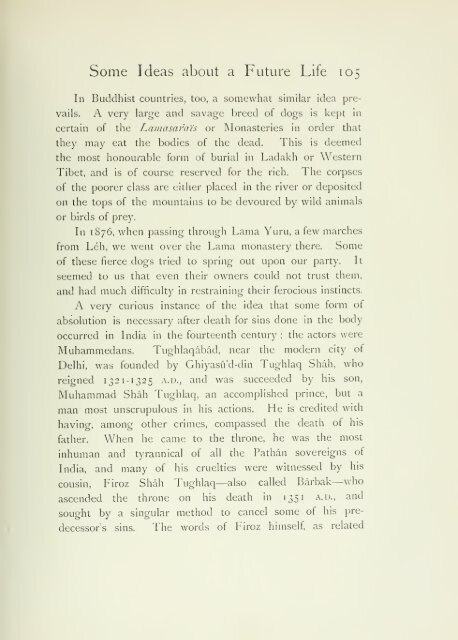- Page 1:
SYMBOLISM OF THE EAST & WEST H. MUR
- Page 5 and 6:
SYMBOLISM OF THE EAST AND WEST
- Page 7:
Symbolism of the East and West By M
- Page 10 and 11:
VI Preface is to furnish a collecti
- Page 12 and 13:
viii Contents CHAPTER IV THE SVASTI
- Page 14 and 15:
X Contents or head of the Rue, a Ne
- Page 16 and 17:
Xll List of Plates XVI. A Talisman
- Page 18 and 19:
xiv Introduction know her only from
- Page 20 and 21:
xvl Introduction of the hoariest an
- Page 22 and 23:
xviii Introduction —"The Ancient
- Page 24 and 25:
XX Introduction Holland; and the fe
- Page 26 and 27:
xxii Introduction the Druidical Fea
- Page 28 and 29:
xxiv I ntroduction the form and dig
- Page 30 and 31:
2 Symbolism of the East and West be
- Page 32 and 33:
4 Symbolism of the East and West as
- Page 34 and 35:
6 Symbolism of the East and West du
- Page 36 and 37:
8 Symbolism of the East and West br
- Page 38 and 39:
lo Symbolism of the East and West w
- Page 40 and 41:
T2 Symbolism of the East and West i
- Page 42 and 43:
CHAPTER II SUN WORSHIP SuN-woRSHir
- Page 44 and 45:
1 6 Symbolism of the East and West
- Page 46 and 47:
1 8 Symbolism of the East and West
- Page 48 and 49:
20 Symbolism of the East and West u
- Page 50 and 51:
22 Symbolism of the East and West h
- Page 53 and 54:
Sun Worship 23 striking piece of sc
- Page 55 and 56:
Sun Worship 25 assemble there at da
- Page 57 and 58:
Sun Worship 27 In his memoirs tlie
- Page 59 and 60:
CHAPTER III SUN AND MOON (oR CUP) S
- Page 61 and 62:
Sun and Moon (or Cup) Symbols 3 lay
- Page 63 and 64:
Sun and Moon (or Cup) Symbols 33 In
- Page 65 and 66:
Sun and Moon (or Cup) Worship 35 go
- Page 68 and 69:
ASIATIC SYMBOLISM. Plate 2 WIZARD'S
- Page 70 and 71:
8 Symbolism of the East and West Sy
- Page 72 and 73:
40 Symbolism of the East and W^est
- Page 74 and 75:
42 Symbolism of the East and W^est
- Page 77 and 78:
Sun and Moon (or Cup) Worship 43 on
- Page 79 and 80:
Sun and Moon (or Cup) Worship 45 of
- Page 82 and 83:
4- SMALL ORNAMENTAL JAPANESE VASE.
- Page 84 and 85:
48 Symbolism of the East and West o
- Page 86 and 87:
50 Symbolism of the East and West s
- Page 88 and 89:
52 Symbolism of the East and West a
- Page 90 and 91:
54 Symbolism of the East and West i
- Page 93 and 94:
The Svastika 55 one of its arms ; t
- Page 95 and 96:
The Svastika 57 about 500 B.C. to 1
- Page 97 and 98:
The Svastika 59 stabit "— "Howeve
- Page 99 and 100:
The Svastika 6i dynasty by Alexande
- Page 101 and 102:
CHAPTER V SOME CONNECTING LINKS BET
- Page 103 and 104:
Some Connectinor Links 6 in Kashmir
- Page 105 and 106: Some Connecting Links 67 origin. At
- Page 107 and 108: Some Connecting Links 69 A tan, wit
- Page 109 and 110: Some Connecting Links 7 form of a G
- Page 111 and 112: Some Connecting Links 'j^ he was th
- Page 113 and 114: Some Connecting Links 75 the kingdo
- Page 116 and 117: I. FROM BENARES i FROM GOVAKDHAN 3
- Page 118: yS Symbolism of the East and West B
- Page 121 and 122: Sacred Stones 79 Srinagar, a group
- Page 123 and 124: Sacred Stones 8i In the book of the
- Page 125 and 126: Sacred Stones 83 the Sacred White S
- Page 127 and 128: Sacred Stones 85 A most remarkable
- Page 129 and 130: AS lATl C SYMBOLISM Nos I 2,3&4._MO
- Page 131 and 132: perhaps intended for the Moon ; Sac
- Page 133 and 134: Sacred Stones 89 piece was put into
- Page 136 and 137: ASIATIC SYMSOLISM. Plate II. MONOLI
- Page 138 and 139: 92 Symbolism of the East and West a
- Page 142 and 143: .>-s ASJATI C SYMBOLISM. STONE CELT
- Page 144 and 145: 94 Symbolism of the East and West N
- Page 147 and 148: animal ; both Sacred Stones 95 the
- Page 149 and 150: Sacred Stones 97 knife from the Lak
- Page 151 and 152: Sacred Stones 99 within seven or mo
- Page 153 and 154: Some Ideas about a Future Life loi
- Page 155: Some Ideas about a Future Life lo J
- Page 159 and 160: Some Ideas about a Future Life 107
- Page 161 and 162: Some Ideas about a Future Life 109
- Page 163 and 164: Sacred Trees 1 1 life." Two kinds o
- Page 165 and 166: Sacred Trees 1 1 In Scandinavia the
- Page 167 and 168: Sacred Trees 1 1 5 All the world ov
- Page 169 and 170: Sacred Trees 1 1 offerings by super
- Page 171 and 172: Sacred Trees 1 1 and thereby produc
- Page 174 and 175: ASIATIC SYMBOLISM. Plate 12. SCALE
- Page 176 and 177: 122 Symbolism of the East and West
- Page 178 and 179: 124 Symbolism of the East and West
- Page 180: CHAPTER IX SNAKE WORSHIP Snake wors
- Page 183 and 184: Snake Worship 127 worn by the women
- Page 185 and 186: Snake Worship 129 both man and drag
- Page 187: ASIATIC SYMBOLISM. Plate 15. TATAR
- Page 190 and 191: 132 Symbolism of the East and West
- Page 192 and 193: 134 Symbolism of the East and West
- Page 194 and 195: 136 Symbolism of the East and West
- Page 196 and 197: CHAPTER X THE EVIL EYE, AND ALLIED
- Page 198 and 199: 140 Symbolism of the East and West
- Page 200 and 201: 142 Symbolism of the East and West
- Page 202 and 203: 144 Symbolism of the East and West
- Page 204 and 205: 146 Symbolism of the East and \\^es
- Page 206:
148 Symbolism of the East and West
- Page 209 and 210:
The Evil Eye, and Allied Notions 14
- Page 211 and 212:
The Evil Eye, and Allied Notions 15
- Page 213 and 214:
The Evil Eye, and Allied Notions 15
- Page 215 and 216:
The Evil Eye, and Allied Notions 15
- Page 217 and 218:
The Evil Eye, and Allied Notions 15
- Page 219 and 220:
The Evil Eye, and Allied Notions 15
- Page 221 and 222:
The Evil Eye, and Allied Notions i6
- Page 223 and 224:
The Evil Eye, and Allied Notions 16
- Page 225 and 226:
The Evil Eye, and Allied Notions 16
- Page 227 and 228:
The Evil Eye, and Allied Notions 16
- Page 229 and 230:
The Evil Eye, and Allied Notions 16
- Page 231 and 232:
CHAPTER XI THE WILD HUNTSMAN OF NOR
- Page 233 and 234:
Wild Huntsman of Northern Europe 17
- Page 235:
ASIATIC SYMBOLISM. Plate 1 8. A BRO
- Page 238 and 239:
176 Symbolism of the East and West
- Page 240:
CHAPTER XII ARCHITECTURAL AND OTHER
- Page 243 and 244:
Architectural and Other Customs 179
- Page 246 and 247:
ASIATIC SYMBOLISM. Plate 2c
- Page 248 and 249:
1 82 Symbolism of the East and \\'e
- Page 251 and 252:
Architectural and Other Customs 183
- Page 253 and 254:
Architectural and Other Customs 185
- Page 255 and 256:
Architectural and Other Customs 187
- Page 257 and 258:
Architectural and Other Customs 189
- Page 259 and 260:
Architectural and Other Customs 191
- Page 261 and 262:
CHAPTER XIII SPAIN, OR FURTHER EURO
- Page 263 and 264:
Spain, or Further Europe 195 that a
- Page 265 and 266:
Spain, or Further Europe 197 mad. A
- Page 267 and 268:
Spain, or Further Europe 199 A.D.)
- Page 269 and 270:
Spain, or Further Europe 201 words
- Page 271 and 272:
Spain, or Further Europe 203 were m
- Page 273:
Q W X H < < 2 O
- Page 276 and 277:
2o6 Symbolism of the East and West
- Page 278 and 279:
2o8 Symbolism of the East and W^est
- Page 280 and 281:
2IO Symbolism of the East and West
- Page 282 and 283:
2 1 2 Symbolism of the East and Wes
- Page 284:
PRINTED BV TURNBULL AND SPEARS EDIN

















